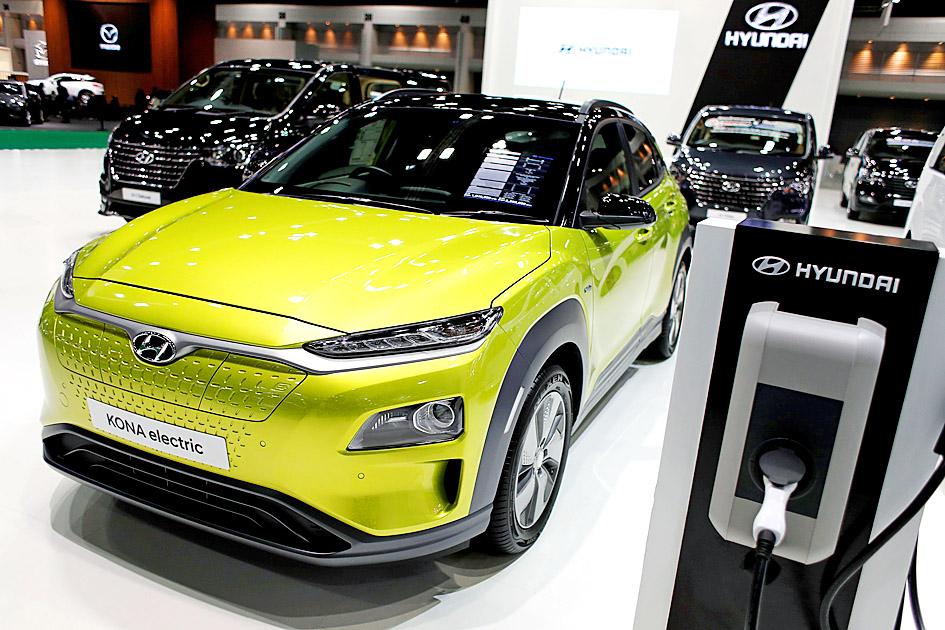Hyundai Motor Group is to invest S$400 million (US$294 million) in a new innovation center in Singapore that Singaporean Prime Minister Lee Hsien Loong (李顯龍) said might produce up to 30,000 vehicles a year by 2025.
“Automotive activities are becoming viable in Singapore once again,” Lee said in a speech yesterday to mark the virtual groundbreaking ceremony for the center in the city-state’s west.
Electric vehicles (EVs) “have a different supply chain, fewer mechanical parts and more electronics, which plays to Singapore’s strengths,” he said.

Photo: Reuters
The seven-story building, which is expected to be completed by the end of 2022, is where Hyundai would work on developing artificial intelligence (AI), big data and other technologies to enhance its manufacturing processes, fine-tuning the “brains” behind the smarter and more environmentally friendly vehicles of tomorrow.
The center would also have a 620m driving track near its roof so that customers can test drive vehicles.
Hyundai would “instill human-centered values” in all stages of a vehicle’s life, from ordering and production to the test drive and service, Hyundai Motor executive vice chairman Euisun Chung said at the event.
The company is separately developing flying cars, planning a full lineup of aerial vehicles that it envisages zigzagging city skies within a decade.
The innovation center would also house a small-scale electric-vehicle production facility to test processes using AI and autonomous driving.
One of the company’s EVs, the Kona, has been recalled in South Korea following multiple reports of battery fires.
“We hope this will open up new growth areas for our economy, and create exciting jobs for Singaporeans, for example industrial Internet of Things engineers, data scientists, cobot technicians and digital supply chain strategists,” Lee said.
Lee also said the center marked “an important milestone in the economic relationship between Singapore and South Korea,” paving the way for more South Korean firms to invest in the city-state and partner with local suppliers.
Singapore has not had an auto manufacturing plant since Ford Motor Co closed its factory several decades ago, effectively ending automobile production on the island.
In October last year, vacuum cleaner maker Dyson Ltd abandoned a US$2.5 billion plan to build electric vehicles in the city-state because it could not find a way of making the project commercially viable.
Tesla Inc, the world’s biggest maker of EVs, has plans to export China-built Model 3 cars to Singapore, and other places in Asia and Europe from its factory in Shanghai, people familiar with the matter said last month.

Hon Hai Precision Industry Co (鴻海精密) yesterday said that its research institute has launched its first advanced artificial intelligence (AI) large language model (LLM) using traditional Chinese, with technology assistance from Nvidia Corp. Hon Hai, also known as Foxconn Technology Group (富士康科技集團), said the LLM, FoxBrain, is expected to improve its data analysis capabilities for smart manufacturing, and electric vehicle and smart city development. An LLM is a type of AI trained on vast amounts of text data and uses deep learning techniques, particularly neural networks, to process and generate language. They are essential for building and improving AI-powered servers. Nvidia provided assistance

GREAT SUCCESS: Republican Senator Todd Young expressed surprise at Trump’s comments and said he expects the administration to keep the program running US lawmakers who helped secure billions of dollars in subsidies for domestic semiconductor manufacturing rejected US President Donald Trump’s call to revoke the 2022 CHIPS and Science Act, signaling that any repeal effort in the US Congress would fall short. US Senate Minority Leader Chuck Schumer, who negotiated the law, on Wednesday said that Trump’s demand would fail, while a top Republican proponent, US Senator Todd Young, expressed surprise at the president’s comments and said he expects the administration to keep the program running. The CHIPS Act is “essential for America leading the world in tech, leading the world in AI [artificial

DOMESTIC SUPPLY: The probe comes as Donald Trump has called for the repeal of the US$52.7 billion CHIPS and Science Act, which the US Congress passed in 2022 The Office of the US Trade Representative is to hold a hearing tomorrow into older Chinese-made “legacy” semiconductors that could heap more US tariffs on chips from China that power everyday goods from cars to washing machines to telecoms equipment. The probe, which began during former US president Joe Biden’s tenure in December last year, aims to protect US and other semiconductor producers from China’s massive state-driven buildup of domestic chip supply. A 50 percent US tariff on Chinese semiconductors began on Jan. 1. Legacy chips use older manufacturing processes introduced more than a decade ago and are often far simpler than

Gasoline and diesel prices this week are to decrease NT$0.5 and NT$1 per liter respectively as international crude prices continued to fall last week, CPC Corp, Taiwan (CPC, 台灣中油) and Formosa Petrochemical Corp (台塑石化) said yesterday. Effective today, gasoline prices at CPC and Formosa stations are to decrease to NT$29.2, NT$30.7 and NT$32.7 per liter for 92, 95 and 98-octane unleaded gasoline respectively, while premium diesel is to cost NT$27.9 per liter at CPC stations and NT$27.7 at Formosa pumps, the companies said in separate statements. Global crude oil prices dropped last week after the eight OPEC+ members said they would